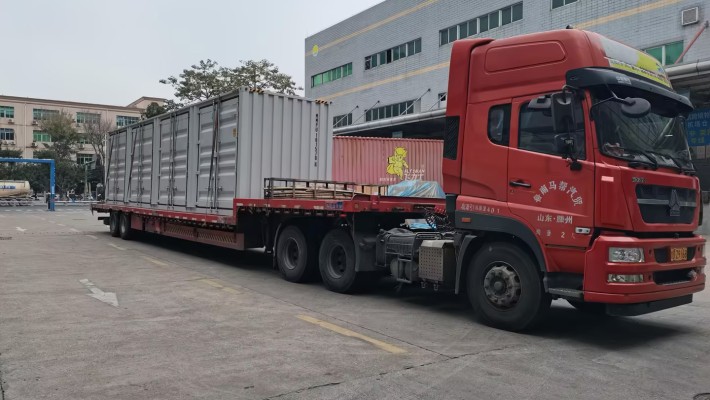Freight Forwarder Insights
Huin International Logistics Latest Articles
Safely shipping commercial battery energy storage systems
The transportation of a Battery Energy Storage System (BESS) is a crucial step in completing the project, but it is often overlooked. The use of Lithium-Ion Phosphate batteries (LFP) provides high power output, but also produces high levels of heat that can lead to fires. This makes them classified as Class 9 hazardous batteries when being shipped in the United States. If not transported safely, the consequences could range from economic losses and equipment damage to potential casualties. However, certain measures can be taken to ensure safe transportation.
The LFP based BESS is classified in the U.S. as a Class 9 Miscellaneous Hazardous Battery because of this. Shipping the LFP based BESS unsafely might result in economic losses, equipment damage, or even casualties. In order to safely ship the LFP based BESS, the following aspects need to be considered.
Battery Testing – DOT/UN 38.3
Lithium batteries are known for their high-energy density and low self-discharge rate. However, the presence of metal lithium in their chemistry also brings some challenges. Due to lithium's unstable and reactive nature, there is a risk of the battery venting hot gases during transportation. This could result in an explosion or fire known as thermal runaway. As a precautionary measure, unlike other types of batteries, those containing Lithium Metal or Lithium Ion must undergo specific testing to ensure safety during transportation.
The DOT/UN 38.3 testing applies to all lithium batteries during transportation, following both the UN Manual of Tests and DOT regulations. This standard is required not only in the US or North America, but also internationally due to the potential crossing of lithium batteries over international waters and borders.
The DOT/UN38.3 certification involves 8 tests, including Altitude Simulation, Thermal Test, Vibration Test, Shock Test, External Short Circuit Test, Impact Test, Overcharge Test, and Forced Discharge Test. In certain situations where there are changes made to the battery or product design before shipping, the battery test certification must be renewed.
UN38.3 testing is essential for batteries being transported domestically or internationally, via any mode of transportation. It serves as confirmation that the battery can be safely shipped through all transportation channels.
Transporting Material – Material Safety Data Sheet (MSDS)
The MSDS, referred to as SDS in China and Europe, is a technical document that contains in-depth information on a controlled product, including:
The potential health impacts of the product, as well as its associated dangerous evaluation in terms of handling, storage, and use, must be taken into consideration. Protective measures must also be implemented to ensure the safety of workers who may come into contact with it. In addition, emergency procedures should be established to address any unexpected situations.
Most dangerous goods transportation firms require the use of an MSDS to effectively handle and minimize risks during transportation. Please be aware that the MSDS is necessary for not only batteries when transporting a BESS, but also for other components such as enclosures, battery cells, packs, and racks.
Battery Specific Packaging
When it comes to transportation packaging for lithium-based batteries, the top priority is preventing short circuits. This can be achieved by individually placing each battery in a plastic bag and covering the terminals with non-conductive tape. Additionally, it's crucial to protect the batteries from vibration and shock. Usually, this is achieved by inserting cushioned material between them before placing them in a box.
Certification for Safe Transportation of Goods
The Safe Transportation of Goods Certification simplifies the MSDS by assessing the safety of cargo transportation in compliance with regulations and standards for transporting hazardous materials. It includes UN 38.3 testing and battery packaging for LFP based BESS transportation. This certification covers four modes of transportation- sea, air, road, and railway- with individual reports displaying results for each specific mode due to varying criteria.
Longevity
According to recent studies, LFP batteries demonstrate a longer lifespan compared to NMC batteries. Experiments conducted at Sandia National Laboratories analyzed various aspects of commercial Lithium-ion chemistries, such as discharge rate, DOD, temperature, capacity, and energy retention, as well as round-trip efficiency. The findings indicate that LFP cells consistently showed superior longevity under all tested conditions among lithium-based chemistries. In conclusion, both chemistries have proven to be effective in terms of battery lifespan.
